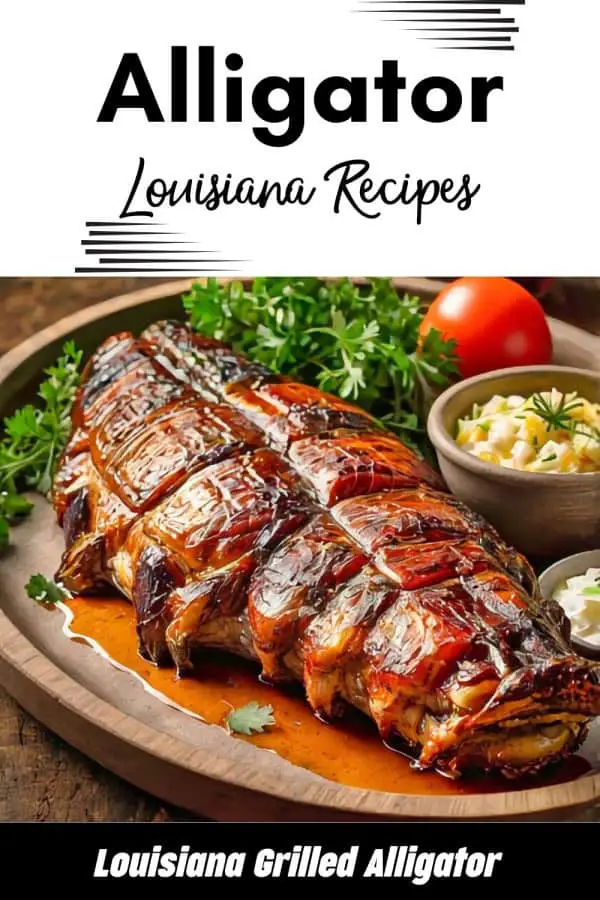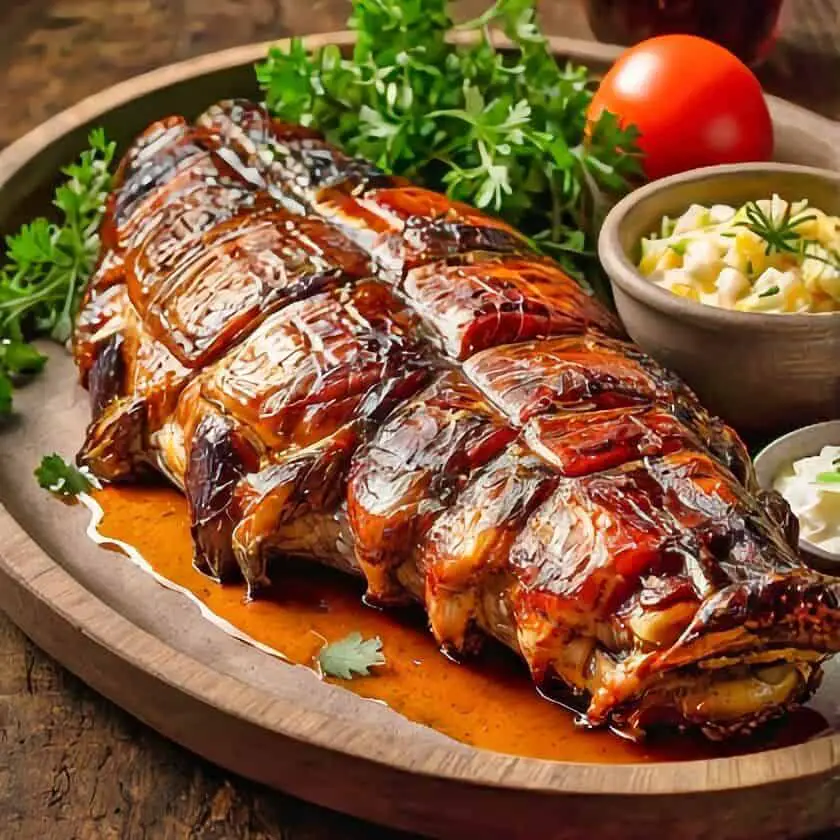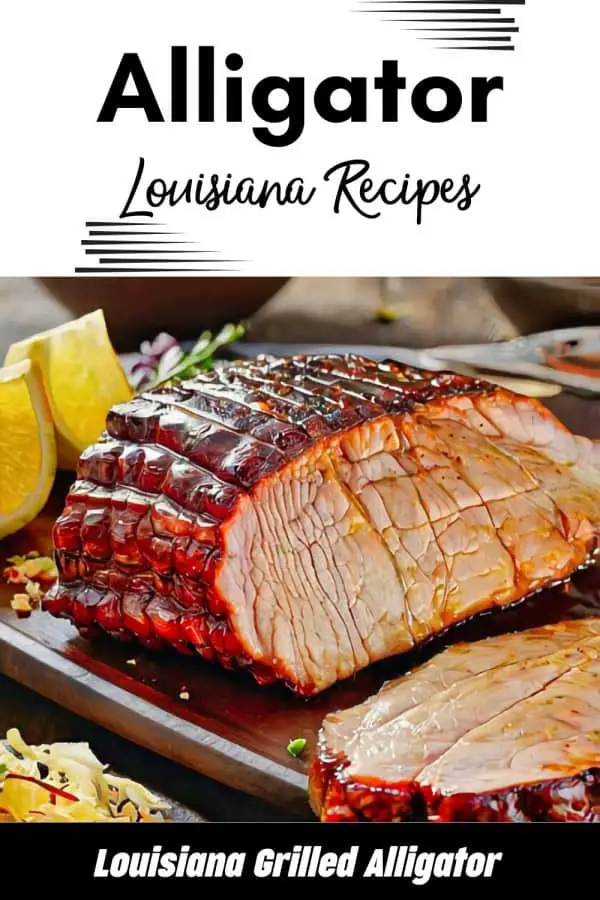The Whole Louisiana Smoked Alligator is an impressive meal that captivates both in size and appearance. The entire alligator is slow-smoked, resulting in a deep, rich brown color with a slightly glossy finish from the natural fats rendered during cooking. Its skin becomes beautifully crisp while the meat underneath remains tender and juicy. The smoky aroma is inviting, and the presentation of the whole alligator, complete with its firm texture and bold flavors, makes this a visually striking and memorable Southern dish.
On our trip to Argentina, discovering the Whole Louisiana Smoked Alligator Recipe at a local restaurant was a delightful surprise. The eatery’s inviting atmosphere set the perfect stage for this unique dish. The anticipation grew as the Whole Louisiana Smoked Alligator Recipe was brought to the table, showcasing a stunning presentation that highlighted the dish’s dramatic appeal.
The alligator, smoked to a deep, rich brown, was laid out whole, making a striking impression. Its crispy, caramelised skin and tender meat underneath were visually appealing, and the smoking process imparted a robust aroma that filled the air. The Whole Louisiana Smoked Alligator Recipe was not only a feast for the eyes but also offered a chance to enjoy a distinctive Southern flavour while in Argentina.
Sampling the Whole Louisiana Smoked Alligator Recipe was a memorable experience, adding a unique touch to the trip. The dish stood out as a highlight of the culinary journey, offering a taste of Cajun cuisine that complemented the local dining scene perfectly. It was a remarkable way to experience something new and enjoy a special moment during the trip.

Ingredients For the Whole Louisiana Smoked Alligator Recipe
For the Alligator
Whole Louisiana Alligator
For the Glaze
Orange Juice
Honey
Bourbon Whiskey
Ground Ginger
For the Seasoning
Smoked Paprika
Kosher Salt
Garlic Powder
Ground Black Pepper
Ground White Pepper
Onion Powder
Dried Oregano
Cayenne
Dried Thyme
Cooking Instructions For the Whole Louisiana Smoked Alligator Recipe
- Thoroughly clean the 30 lb Whole Alligator (dressed) and pat it dry with paper towels. Use a sharp knife to remove any excess fat and skin from the alligator. Rinse the alligator inside and out with cold water to ensure it’s clean.
- In a bowl, combine 2 cups of Cajun Seasoning and set it aside. Make sure the Cajun Seasoning is evenly mixed for consistent flavor.
- Prepare the glaze by combining 3/4 cup of orange juice, 1/2 cup of honey, 2 tbsp of bourbon, and 1 tbsp of ground ginger in a separate bowl. Stir the mixture until the honey is fully dissolved.
- For the seasoning mix, combine 3 tablespoons of smoked paprika, 2 tablespoons of fine kosher salt, 2 tablespoons of garlic powder, 1 tablespoon of ground black pepper, 1 tablespoon of ground white pepper, 1 tablespoon of onion powder, 1 tablespoon of dried oregano, 1 tablespoon of cayenne, and 1/2 tablespoon of dried thyme in another bowl. Ensure all the spices are thoroughly mixed to create a balanced seasoning.
- Preheat your smoker to 225°F (107°C) using your preferred wood chips or chunks for smoking. Maintain a consistent temperature throughout the smoking process.
- Rub the prepared Cajun Seasoning generously all over the cleaned and dried alligator. Make sure to cover every part of the alligator for even flavor.
- Inject the glaze mixture into different parts of the alligator using a meat injector.Distribute the glaze evenly to infuse flavor into the meat.
- Apply the prepared seasoning mix to the entire alligator, pressing it into the meat for better adhesion.
Ensure that the seasoning covers the alligator evenly for a balanced taste. - Place the seasoned alligator onto the smoker’s grates. Arrange it carefully to allow proper airflow and even cooking.
- Smoke the alligator at 225°F (107°C) for approximately 4 to 5 hours, or until the internal temperature reaches 160°F (71°C). Monitor the temperature regularly to avoid overcooking or undercooking.
- During the smoking process, baste the alligator with any remaining glaze every hour to keep it moist and flavorful. Use a brush or a mop to apply the glaze evenly.
- Once the alligator reaches the desired internal temperature, remove it from the smoker. Let it rest for about 20 minutes before carving to allow the juices to redistribute.

5 Health Benefits of Eating Alligator
Alligator meat offers several health benefits, making it an excellent protein choice. Here are five key advantages of including alligator in your diet:
1. Lean Protein: Alligator meat is exceptionally lean, making it lower in fat compared to other meats like beef or pork. This can help reduce overall fat intake while still providing high-quality protein, essential for muscle growth and repair.
2. Low Cholesterol: Alligator contains less cholesterol than many other meats, making it a heart-healthy option. Lower cholesterol levels help support cardiovascular health, reducing the risk of heart disease.
3. Rich in Omega-3 Fatty Acids: Alligator meat provides a good source of omega-3 fatty acids, which are known for their anti-inflammatory properties. Omega-3s support heart health, improve brain function, and reduce inflammation in the body.
4. High in Vitamins and Minerals: Alligator meat is rich in essential nutrients like potassium, iron, and niacin. These vitamins and minerals are vital for maintaining energy levels, promoting healthy blood circulation, and supporting overall bodily functions.
Sustanaility of Alligator Meat
The sustainability of alligator meat is an important factor in its growing popularity. Alligators, once endangered, have made a strong comeback due to successful conservation efforts and regulated farming practices. In the U.S., particularly in states like Louisiana and Florida, alligator farming is strictly regulated to ensure healthy populations and prevent overharvesting. This makes alligator meat a sustainable choice for those looking for an alternative protein source.
Farmed alligators are raised in environments that replicate their natural habitat, but with added oversight to ensure humane and eco-friendly practices. The meat is harvested without harming wild populations, which helps maintain the delicate balance in local ecosystems. Additionally, many parts of the alligator, including its skin, are used for leather goods, making the farming process efficient with minimal waste.
Sustainably sourced alligator meat also supports local economies, especially in regions where farming and harvesting are a cultural tradition. By buying farmed alligator, consumers are contributing to ongoing conservation efforts while enjoying a unique, lean protein.
In summary, the sustainability of alligator meat comes from responsible farming and regulation, helping to protect wild populations and providing an eco-friendly food source that supports both the environment and local economies.
When selecting the best alligator meat, several factors come into play. The most tender and flavorful cuts generally come from the tail, which is often considered the best choice. The tail meat is white and has a texture similar to veal or chicken, making it highly versatile for various recipes. It’s lean and mildly flavored, perfect for grilling, frying, or using in stews.
Other cuts, like the legs, are a bit tougher and more suited for dishes that require slow cooking or braising. These cuts are often darker and have a gamier taste, making them ideal for rich gumbos or jambalayas.
When purchasing alligator, it’s important to look for sustainably farmed options, as wild alligator can have inconsistent quality due to diet and habitat. Ensure the meat is fresh or properly frozen, as this affects the overall taste and texture.
In terms of preparation, marinating the alligator tail can help tenderize it and add flavor. Overall, the best alligator choice depends on the dish you’re preparing, but the tail meat remains a top favorite due to its tenderness and adaptability across various cooking methods.
Why I Love Cooking Alligator Recipes
Cooking alligator recipes is a unique experience that brings a sense of excitement to the kitchen. One of the reasons I enjoy it so much is the versatility of alligator meat, especially the tail, which has a mild flavor and a texture similar to chicken or veal. This makes it perfect for grilling, frying, or incorporating into dishes like gumbo or jambalaya.
Another reason I love cooking alligator is the challenge it presents. Alligator meat is lean and can be tricky to cook just right, which pushes me to experiment with different methods and seasonings. Whether I’m grilling alligator steaks or frying bites for a party appetizer, it always brings out my creative side.
Additionally, alligator recipes have a novelty factor, impressing guests with a dish that’s far from ordinary. It’s always fun to see their reactions when they try alligator for the first time, especially when prepared well.
Lastly, cooking alligator connects me to the southern traditions where it’s a common ingredient in regional cuisine. It allows me to explore new flavors and techniques while also paying homage to classic recipes from the Gulf Coast. Cooking alligator has become a flavorful, creative adventure in my kitchen.
FAQ For the Whole Louisiana Smoked Alligator Recipe
Q: What is the grilled Louisiana smoked Alligator recipe?
The grilled Louisiana smoked Alligator recipe involves marinating alligator meat, smoking it to impart a rich flavour, and then finishing it on the grill to create a tender and smoky dish.
Q: What ingredients are needed for the grilled Louisiana smoked Alligator recipe?
The grilled Louisiana smoked Alligator recipe typically includes alligator meat, a dry rub or marinade with spices like paprika, garlic, and cayenne, and wood chips for smoking.
Q: How do you prepare the grilled Louisiana smoked Alligator recipe?
To prepare the grilled Louisiana smoked Alligator recipe, first marinate the alligator meat with spices, smoke it over wood chips to infuse flavour, and then grill it to achieve a crispy exterior.
Q: Can you use different types of wood for the grilled Louisiana smoked Alligator recipe?
Yes, you can use different types of wood for the grilled Louisiana smoked Alligator recipe, such as hickory, mesquite, or oak, depending on the flavour profile you prefer.
Q: What can you serve with the grilled Louisiana smoked Alligator recipe?
The grilled Louisiana smoked Alligator recipe pairs well with sides like grilled vegetables, coleslaw, or a tangy dipping sauce to complement the smoky, savoury flavour of the alligator.

Whole Louisiana Smoked Alligator Recipe
Ingredients
- 30 lb Alligator dressed Whole
- 2 cups Cajun Seasoning
- 3/4 cup orange juice
- 1/2 cup honey
- 2 tbsp bourbon
- 1 tbsp ground ginger
- 3 tbsps smoked paprika smoked
- 2 tbsps kosher salt fine
- 2 tbsps garlic powder
- 1 tbsp black pepper ground
- 1 tbsp white pepper ground
- 1 tbsp onion powder
- 1 tbsp oregano dried
- 1 tbsp cayenne
- 1/2 tbsp thyme dried
Equipment
- Large smoker
- Meat injector
- Mixing Bowls
- Basting Brush
- Sharp knife
- Meat Thermometer
- Meat carving tools
Instructions
- a. Use a sharp knife to remove any excess fat and skin from the alligator.
- b. Rinse the alligator inside and out with cold water to ensure it's clean.
- a. Make sure the Cajun Seasoning is evenly mixed for consistent flavor.
- a. Stir the mixture until the honey is fully dissolved.
- a. Ensure all the spices are thoroughly mixed to create a balanced seasoning.
- a. Maintain a consistent temperature throughout the smoking process.
- a. Make sure to cover every part of the alligator for even flavor.
- a. Distribute the glaze evenly to infuse flavor into the meat.
- a. Ensure that the seasoning covers the alligator evenly for a balanced taste.
- a. Arrange it carefully to allow proper airflow and even cooking.
- a. Monitor the temperature regularly to avoid overcooking or undercooking.
- a. Use a brush or a mop to apply the glaze evenly.
- a. Let it rest for about 20 minutes before carving to allow the juices to redistribute.



3 comments
Get a whole gator when you are camping in the South, You will love this meal.
I never thought about trying alligator meat before, but after reading about the Louisiana Smoked Alligator recipe, Im kind of intrigued! Who knew it could be so versatile and even have health benefits? Might have to give it a try!
Wow, never thought Id consider eating alligator! But after reading about the health benefits and sustainability, I might give it a try. Who knew gator meat could be so intriguing?
Comments are closed.